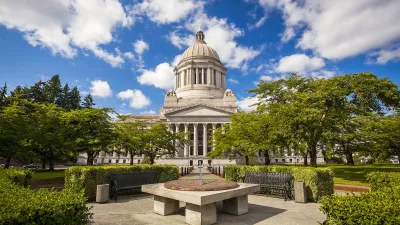The extremely strict proposal would eliminate sharp rent increases, but could stifle housing construction and worsen the city's housing crisis.

Bill Lindeke describes the details of St. Paul's proposed rent stabilization ordinance, which, if passed by voters in November, "would place unprecedented restrictions on the construction of new housing," leaving "an open question what it would do to the city’s housing market."
As proposed, "[t]he law would cap rent increases for all of the city’s 65,000 rented homes at 3% per year, but includes a complicated list of factors that allow landlords to apply for a variances — things like property taxes, maintenance issues, capital improvements (only if needed to bring a building to code), and a few others." According to Shane Phillips, author of The Affordable City, "historically, rent control policies have sometimes made housing crises worse by reducing the size and quality of the housing supply." Consequently, most of today's rent stabilization programs are "explicitly designed to ensure that the housing supply keeps growing."
Lindeke points to three issues with the St. Paul plan that could exacerbate the city's housing crisis. First, the policy does not exempt new construction, which could discourage developers from building in the first place. Second, the plan does not account fo inflation, yet "[a]lmost every other program is pegged somehow to the consumer price index (CPI) or enlists a committee that sets annual rates based on local conditions." The third factor is the unusual step of controlling rent on vacant units, rather than for each individual tenant, creating a situation "rife for potential corruption" and discrimination.
"if the HENS proposal passes, it would put St. Paul on its own," says Lindeke, and "will almost certainly cause other problems that would make the housing crisis even worse."
FULL STORY: If approved by voters, St. Paul’s rent control ordinance would be among the strictest in the world

Alabama: Trump Terminates Settlements for Black Communities Harmed By Raw Sewage
Trump deemed the landmark civil rights agreement “illegal DEI and environmental justice policy.”

Planetizen Federal Action Tracker
A weekly monitor of how Trump’s orders and actions are impacting planners and planning in America.

The 120 Year Old Tiny Home Villages That Sheltered San Francisco’s Earthquake Refugees
More than a century ago, San Francisco mobilized to house thousands of residents displaced by the 1906 earthquake. Could their strategy offer a model for the present?

Ken Jennings Launches Transit Web Series
The Jeopardy champ wants you to ride public transit.

BLM To Rescind Public Lands Rule
The change will downgrade conservation, once again putting federal land at risk for mining and other extractive uses.

Indy Neighborhood Group Builds Temporary Multi-Use Path
Community members, aided in part by funding from the city, repurposed a vehicle lane to create a protected bike and pedestrian path for the summer season.
Urban Design for Planners 1: Software Tools
This six-course series explores essential urban design concepts using open source software and equips planners with the tools they need to participate fully in the urban design process.
Planning for Universal Design
Learn the tools for implementing Universal Design in planning regulations.
Clanton & Associates, Inc.
Jessamine County Fiscal Court
Institute for Housing and Urban Development Studies (IHS)
City of Grandview
Harvard GSD Executive Education
Toledo-Lucas County Plan Commissions
Salt Lake City
NYU Wagner Graduate School of Public Service





























